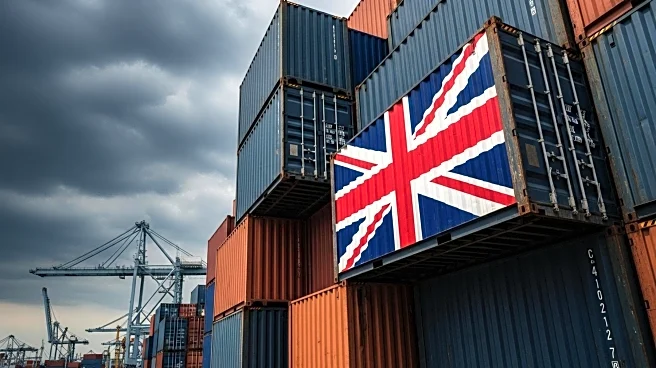What's Happening?
The demand for British exports has decreased at the fastest rate since April, following the announcement of global tariffs by President Trump. According to a survey conducted by S&P Global, the purchasing managers' index (PMI) fell to 51 from a one-year high of 53.5 in August. Although the index remains above the 50 threshold, indicating growth, it is below the 53 anticipated by economists. The decline is attributed to a slump in both services and manufacturing sectors, with factory output experiencing intensified downturns this month. The gauge of total new orders from abroad recorded its worst performance in five months.
Why It's Important?
The decline in UK export orders highlights the impact of global tariffs on international trade, particularly affecting the British economy. This downturn could have significant implications for UK businesses reliant on exports, potentially leading to reduced revenues and economic growth. The manufacturing sector, already facing challenges, may experience further strain, affecting employment and investment. The broader economic impact could extend to other sectors, influencing policy decisions and trade negotiations. Stakeholders, including businesses and policymakers, must navigate these challenges to mitigate adverse effects on the economy.
What's Next?
The UK government and businesses may need to reassess their strategies in response to the declining export orders. Potential steps could include exploring new markets, enhancing competitiveness, and negotiating trade agreements to counteract the effects of tariffs. Policymakers might consider measures to support affected industries, such as financial aid or incentives for innovation. The situation may also prompt discussions on the future of international trade relations and the role of tariffs in global commerce. Monitoring economic indicators and industry responses will be crucial in understanding the long-term impact.
Beyond the Headlines
The decline in export orders may also have cultural and social implications, as industries adapt to changing global trade dynamics. The shift could influence consumer behavior, with potential changes in product availability and pricing. Additionally, the situation may spark debates on the ethical considerations of tariffs and their impact on global cooperation. Long-term shifts in trade policies could redefine economic relationships and influence geopolitical strategies, affecting how countries engage in international commerce.









